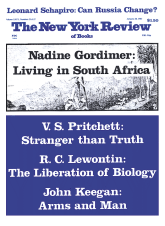In response to:
Pandora's Box from the October 21, 1982 issue
To the Editors:
Sara Laschever’s review of Louise Brooks’s Lulu in Hollywood [NYR, October 21] is inaccurate in describing the plays on which G. W. Pabst based his movie Pandora’s Box. Laschever writes:
Wedekind’s plays, Die Büchse der Pandora (Pandora’s Box) and Erdgeist (Earth Spirit), feature a prostitute named Lulu, whose careless amorality destroys men and ultimately causes her own violent death. Lulu is not a symbol of vice or degradation: her appetite for pleasure is childlike and unselfconscious, her fearlessness is a passive quality. She is, in Wedekind’s words, “not a real person, but the personification of primitive sexuality, who inspires evil unawares.”
I encourage your readers to turn to the original plays and discover that Wedekind was not by a long shot as mystified by sexuality as Laschever’s account may have led them to believe. Lulu inhabits a very modern world of publicity, financial hanky-panky, and sexual exploitation; all she really does is apply the lessons this world teaches her to the marketing of her one commodity: the ability of her body to elicit fantasies of forbidden fruit from stupid or simply weak men. (The one woman she attracts, Countess Geschwitz, is a much more formidable lover.) In numerous passages Lulu demonstrates that her virtuoso technique is not in any way intuitive or natural or primitive, but rather fully conscious and hard-nosed (almost as though Katherine Hepburn were playing the role of a very “wicked” call girl who hopes in vain that someone like Spencer Tracy will offer her an intelligent alternative). She does go too far, certainly; but mostly in the manner of an Aron Nimzowitsch, who was simply too brilliant a chess master to play the sort of cautious game required for consistent victory in tournaments.
What Laschever has done is apparently to become another willing victim of the Lulu mystique; and countless other hasty readers (journalists, editors, and critics) have done likewise. G. W. Pabst created a Lulu very different from the one in Wedekind (which, by the way, he had every right to do, although I think Wedekind’s creation has more to say to us now); and even the genius of Alban Berg has, I’m afraid, somewhat mystified the plays that he condensed into his libretto (which he too, of course, had every right to do, although Lulu ranks below Wozzeck in my esteem for this very reason). What Wedekind said in public about Lulu is not binding on us; in any case, he had censorship and obscenity trials to contend with. It made sense for him to assimilate Lulu to a myth of primitive sexual evil that she herself manipulates, that is all too firmly anchored in our tradition, and that was easier for Wedekind’s contemporaries to accept than the shrewd and witty plays he actually wrote. The animal trainer in the prologue to Erdgeist really says it all: Stroll into the tent and behold the snake of natural sexuality! But he is functioning as a carnival barker; the audience is definitely not going to get what it paid for, although it always has the sad option of not noticing.
My purpose in offering these reflections is to encourage your readers to look into a sophisticated German dramatist whose work has been regularly and consistently misrepresented. I doubt that Sara Laschever has won any new or renewed readers for the Lulu plays; but anyone on this side of the Atlantic who admires Shaw or Ibsen or Chekhov deserves to know the real Wedekind.
Now think again about Louise Brooks.
Howard Stern
Columbia University
New York City
Sara Laschever replies:
I join Mr. Stern in hoping that readers will look again at Wedekind’s plays, but my undertaking in reviewing Lulu in Hollywood was to evaluate the life, writings, and career of Louise Brooks. It was not to win “new or renewed readers for the Lulu plays.” I made no pretense of giving a full critical account of Erdgeist and Die Büchse der Pandora, but merely identified the one or two qualities in Wedekind’s Lulu that most influenced the Pabst and Brooks version of the role. I described Lulu’s sexual persona in Wedekind’s plays in order to contrast it with Louise Brooks’s considerably more confused and inconsistent one.
I said nothing to suggest that Wedekind was “mystified by sexuality,” as Mr. Stern alleges, nor do I see how Lulu’s willingness and, as Mr. Stern calls it, virtuosity, in marketing her sensuality are in any way at odds with my description of its fundamental quality. It is true that we are not bound to agree with Wedekind’s public statements about his work, but we are entitled to when we do. As per Mr. Stern’s instructions, I have thought again about Louise Brooks, and I have discovered no instance in which I would like to revise my understanding of her life and work.
This Issue
January 20, 1983



